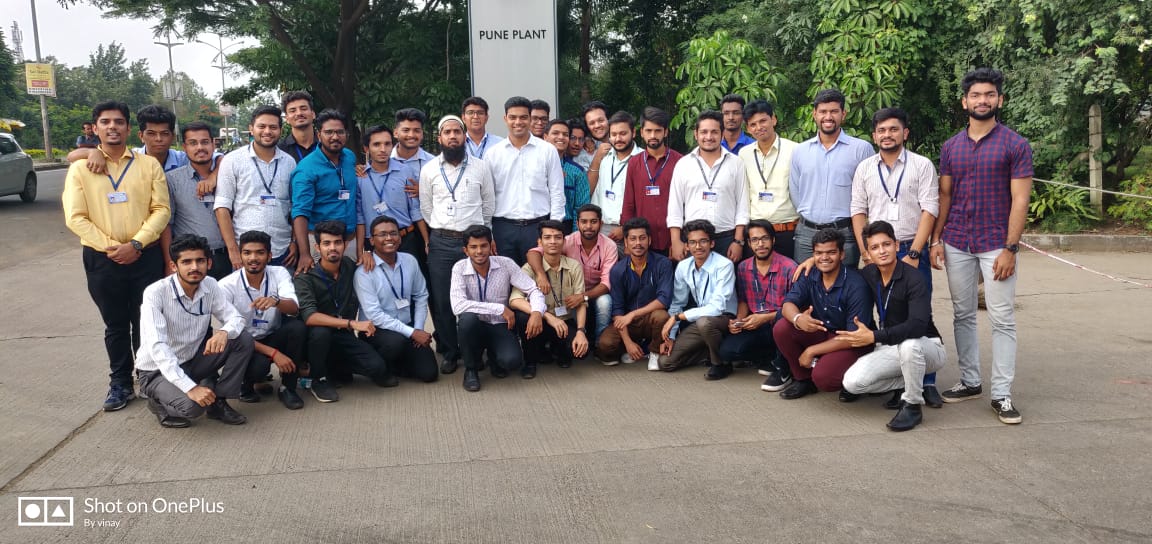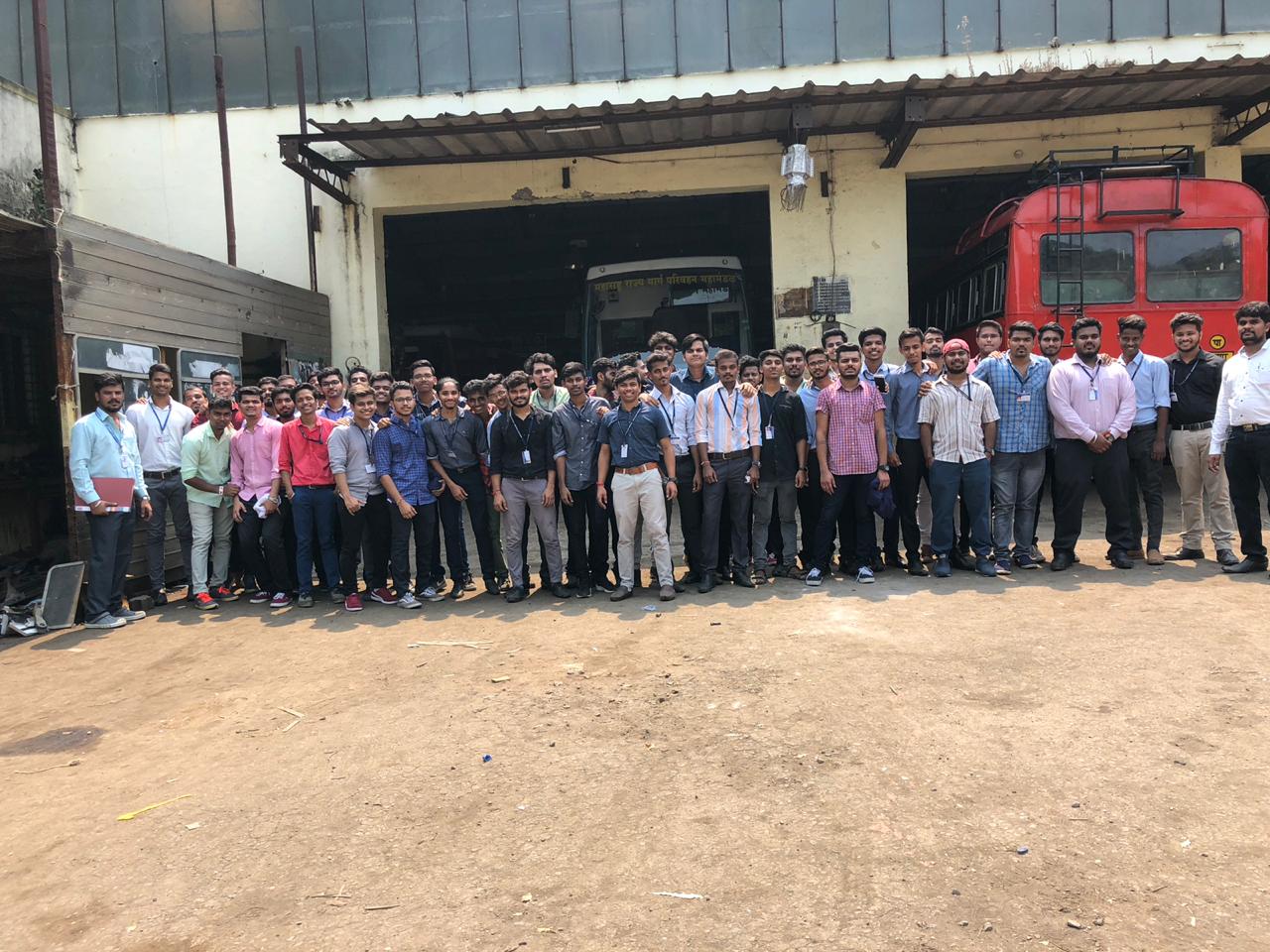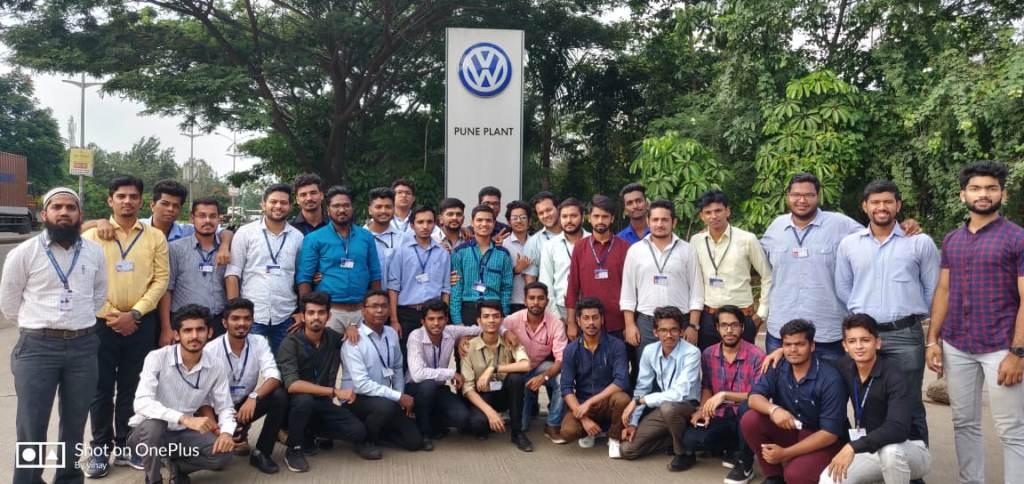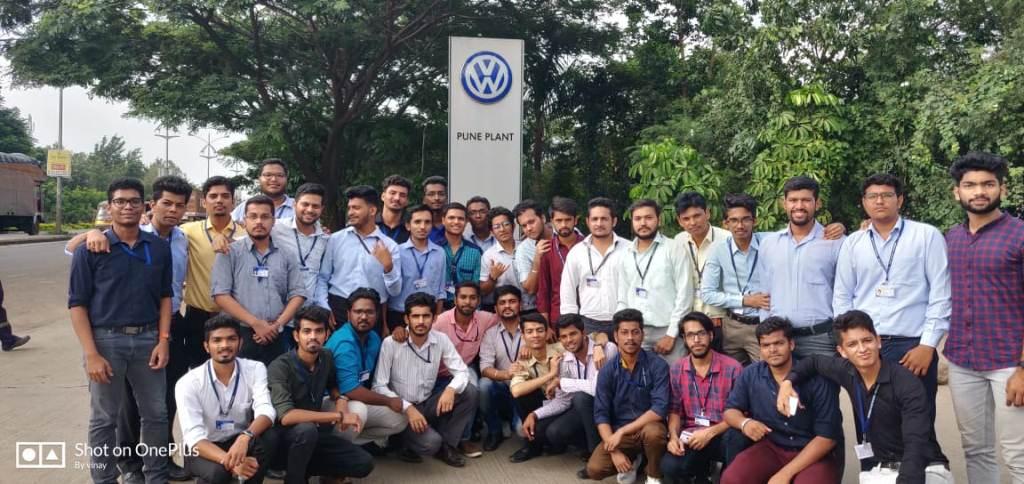Welcome to Automobile Engineering
The department of Automobile engineering has been established with a vision to achieve excellence in the field of automobile and educate students in the area of automobile engineering that will meet the need of industries. The department consists of young and energetic faculties. Besides the routine academic work, the faculties are also engaged in research work and present papers in national conferences and seminars. The department enriches the students with higher technical knowledge and develop their personality to sustain in competitive industrial environment. Apart from the above the department is actively functioning in SAE and associated activities. Every year team of students are been selected for SAE SUPRA formula race car construction and ISK Go-Kart.
More Info...
Vision
Providing high quality technical and professional education to empower the automobile engineers for contributing to global demand.
Mission
M1:To inculcate the recent technological trends in learning and research activities
M2:To offer opportunities for undertaking collaborative projects with automotive industry as a long-term learning
M3:To impart the knowledge of state-of-art designing and simulation of vehicle with better safety and less pollution
Engineering Graduates will be able to:
Engineering Knowledge: Apply the knowledge of science, mathematics, engineering fundamentals and engineering
specialization for research, innovation and solving automobile engineering problems.
Problem Analysis: Use the basic principles of natural science, mathematics and engineering for identifying and analyzing the automobile engineering problems to reach the suitable conclusions.
Design/Development of Solutions: Design solutions for automobile engineering problems to meet the specified needs with appropriate consideration to the environment, public health and safety.
Conduct Investigations of Complex Problems: Use research-based knowledge including design of experiments, data interpretation and synthesis of information to provide valid conclusions.
Modern Tool Usage: Select the appropriate techniques, resources, modern engineering including modelling and prediction for automobile engineering activities with an understanding of the limitations.
The Engineer and Society: Apply reasoning and logical thinking relevant to automobile engineering with understanding of consequent responsibilities towards societal, health, safety, legal and cultural issues.
Environment and Sustainability: Understand the cause of professional engineering solutions in societal and environmental contexts to conserve suitable environment for sustainable development.
Ethics: Apply ethical principles, commit to professional ethics and responsibilities and norms of the automobile engineering.
Individual and Teamwork: Function effectively as an individual or as a member or leader in diverse teams and in multidisciplinary settings.
Communication: Communicate effectively with engineering community in automobile engineering activities, be able to comprehend, write effective reports, design documentations and make effective presentation with clear instructions.
Project Management and Finance: Manage projects in multidisciplinary environment with the skill of handling monetary resources in one's own work.
Life-long Learning: Recognize the need for life-long learning in the broadest context of technological change.
Programme Specific Outcomes
PSO 1: Engineering Graduates will be able to utilize the principles of designing, machine manufacturing and thermal engineering to meet the automobile engineering requirements.
PSO 2: Engineering Graduates will be able to provide sustainable solution to automobile engineering problems.
Programme Educational Objectives
PEO 1: To acquire fundamental technical knowledge and develop essential proficiency in varied areas of basic science, mathematics and engineering science.
PEO 2: To inculcate core automobile areas such as vibration, thermal engineering, design of automotive system and autotronics to meet the automobile industry challenges.
PEO 3: To enhance competency in interdisciplinary approach and research activities.
PEO 4: To inculcate teamwork, leadership skills, problem solving and decision making skills and entrepreneurship.

Prof. Irshad Gulab Shaikh
HOD, Automobile Department
It is my privilege to welcome all of you to the department of Automobile Engineering at Theem College of Engineering, Boisar.The department involves the understanding of Mechanics of Vehicle Chassis, Internal Combustion Engine, CAD and Maintenance of Automobile. Importance is given to quality teaching, ethical and enterprising values to be incorporated in our Academics.
Event Description Photos
| Inauguration of "Theem Excellence Centre-Automobile(TECA)" | "TECA is the most advanced training centre in Suburban Mumbai where students practice dismantling and assembling different advanced automobile systems" | More Photos |
| Industrial Visit | Volkswagen Plant, Pune |  More Photos |
| Workshop on “Latest Trends in Automobiles” | To expose students latest technical innovations in modern vehicles and automatic advance safety. | More Photos |
| Industrial Visit "ST Workshop Palghar" | The student of T.E. Automobile Engineering has been exposed to current technology used in S.T Bus. They also learned to assemble the different systems such as gearbox, differential and transmission line. |  More Photos |
Teaching Staff

| Designation: | Asst Professor & Head |
| Qualification: | ME (Manufacturing System Engg.), BE (Automobile) |
| Area of Interest: | Automotive System, Production Planning & Control, Quality Control, Total Quality Management, Manufacturing Technology |
| Email: | irshad.shaikh@theemcoe.org |

| Designation: | Asst Professor |
| Qualification: | M.TECH (Automobile), B.TECH (Mechanical) |
| Area of Interest: | Computational Fluid Dynamics(cfd), Automotive System, Design And Analysis, Finite Element Analysis, Product Design And Development, Production Process |
| Email: | quazi.noved@theemcoe.org |

| Designation: | Asst Professor |
| Qualification: | ME (Manufacturing System Engg.), BE MECH |
| Area of Interest: | Manufacturing Tech, Material Tech, Mechatronics |
| Email: | nitin.galwade@theemcoe.org |

| Designation: | Asst Professor |
| Qualification: | ME Thermal, BE Mechanical |
| Area of Interest: | |
| Email: | zaid.ansari@theemcoe.org |

| Designation: | Asst Professor |
| Qualification: | ME HEAT POWER ENGINEERING, BE MECHANICAL |
| Area of Interest: | Thermal And Fluid Sciences, Computational Fluid Dynamics(cfd), Operation Research, Theory Of Machine |
| Email: | devang.patil@theemcoe.org |

| Designation: | Asst Professor |
| Qualification: | M.E.Mechanical, BE Mechanical |
| Area of Interest: | |
| Email: | fahad.shaikh@theemcoe.org |

| Designation: | Asst Professor |
| Qualification: | M.Tech CAD/CAM, |
| Area of Interest: | Cad/cam, Engineering Mechanics, Engineering Graphics, Dynamics Of Machine, Kinematics Of Machine. Design. |
| Email: | abhishek.mane@theemcoe.org |

| Designation: | Asst Professor |
| Qualification: | M.E (Machine Design), |
| Area of Interest: | Machine Design, Strength Of Materials, Kinematics Of Machinery, Dynamics Of Machinery, Finite Element Analysis, Theory Of Machines, Mechanical Vibrations |
| Email: | habib.khan@theemcoe.org |
Non-Teaching Staff
Name of the Laboratory Description
| Automotive System Lab
View Lab | Automobile Lab established with the help of NAVNEET MOTORS AND BMW since then we have been able to renew and extend many automotive facilities.Tool Box with Specially designed handle for easy fit.. This laboratory is set to perform disassembly andassembly of automotive systems which includes detailed study about sub assemblies and function of different components. |
| I. C. Engine Lab
View Lab | This laboratory focuses on learning different CONCEPTS OF Internal Combustion Engine and its practical aspects, Such as Trial on Petrol / Diesel Engines as well as Performance for MORSE test. |
| Vehicle Maintenance
View Lab | This laboratory facilities were introduced in the year 2016 . Since then, components and systems of car were set to perform engine analysis and vehicle diagnostics that deal with the learning concepts including practical knowledge. The major equipments are Wheel Alignment machine, Wheel Balancing machine,OBD Scanner, Tyre changing machine and Fuel injection pump. |
| Autotronics Lab
View Lab | This laboratory focuses on basic study of electronic-components and systems of car Lead Acid Batteries, Battery chargers etc. |
Notice Board
| Sem 3 | Applied Mathematics III | Demonstrate the ability of using Laplace Transform in solving the Ordinary Differential Equations and Partial Differential Equations | Demonstrate the ability of using Fourier Series in solving the Ordinary Differential Equations and Partial Differential Equations | Solve initial and boundary value problems involving ordinary differential equations | Identify the analytic function, harmonic function, orthogonal trajectories | Apply bilinear transformations and conformal mappings | Identify the applicability of theorems and evaluate the contour integrals. | Thermodynamics | Demonstrate application of the laws of thermodynamics to wide range of systems. | Write steady flow energy equation for various flow and non-flow thermodynamic systems | Compute heat and work interactions in thermodynamics systems | Demonstrate the interrelations between thermodynamic functions to solve practical problems. | Use steam table and mollier chart to compute thermodynamics interactions | Compute efficiencies of heat engines, power cyclesetc. | Strength of Materials | Demonstrate fundamental knowledge about various types of loading and stresses induced. | Draw the SFD and BMD for different types of loads and support conditions. | Analyse the stresses induced in basic mechanical components. | Estimate the strain energy in mechanical elements. | Analyse the deflection in beams. | Analyse buckling and bending phenomenon in columns, struts and beams. | Production Process I | Demonstrate understanding of casting process | Illustrate principles of forming processes | Demonstrate applications of various types of welding processes. | Differentiate chip forming processes such as turning, milling, drilling, etc. | Illustrate the concept of producing polymer components and ceramic components | Distinguish between the conventional and modern machine tools. | Material Technology | Identify various crystal imperfections, deformation mechanisms, and strengthening mechanisms | Demonstrate understanding of various failure mechanisms of materials. | Interpret Iron-Iron carbide phase diagram, and different phases in microstructures of materials at different conditions | Select appropriate heat treatment process for specific applications. | Identify effect of alloying elements on properties of steels | Illustrate basics of composite materials, Nano- materials and smart materials. |
| Sem 4 | Applied Mathematics IV | Solve the system of linear equations using matrix algebra with its specific rules | Demonstrate basics of vector calculus | Apply the concept of probability distribution and sampling theory to engineering problems | Apply principles of vector calculus to the analysis of engineering problems | Identify, formulate and solve engineering problems | Illustrate basic theory of correlations and regression | Fluid Mechanics | Define properties of fluids and classification of fluids | Evaluate hydrostatic forces on various surfaces and predict stability of floating bodies | Formulate and solve equations of the control volume for fluid flow systems | Apply Bernoulli?s equation to various flow measuring devices | Calculate resistance to flow of incompressible fluids through closed conduits and over surfaces | Apply fundamentals of compressible fluid flows to relevant systems | Industrial Electronics | Illustrate construction, working principles and applications of power electronic switches | Identify rectifiers and inverters for dc and ac motor speed control | Develop circuits using OPAMP and timer IC555 | Identify digital circuits for industrial applications | Illustrate the knowledge of basic functioning of microcontroller | Analyse speed-torque characteristics of electrical machines for speed control | Production Process II | Demonstrate understanding of metal cutting principles and mechanism | Identify cutting tool geometry of single point and multipoint cutting tool | Demonstrate various concepts of sheet metal forming operations | Demonstrate concepts and use of jigs and fixtures | Illustrate various non-traditional machining techniques | Illustrate concepts and applications of additive manufacturing | Kinematics of Machinery | Define various components of mechanisms | Develop mechanisms to provide specific motion | Draw velocity and acceleration diagrams of various mechanisms | Draw Cam profile for the specific follower motion | Analyse forces in various gears | Select appropriate power transmission for specific application |
| Sem 5 | Internal Combustion Engines | Demonstrate the working of different systems and processes of S.I. engines | Demonstrate the working of different systems and processes of C.I. engines | Illustrate the working of lubrication, cooling and supercharging systems. | Analyse engine performance | Illustrate emission norms and emission control | Comprehend the different technological advances in engines and alternate fuels | Mechanical Measurements and Control | Classify various types of static characteristics and types of errors occurring in the system. | Classify and select proper measuring instrument for linear and angular displacement | Classify and select proper measuring instrument for pressure and temperature measurement | Design mathematical model of system/process for standard input responses | Analyse error and differentiate various types of control systems and time domain specifications | Analyse the problems associated with stability | Heat Transfer | Identify the three modes of heat transfer (conduction, convection and radiation). | Illustrate basic modes of heat transfer | Develop mathematical model for each mode of heat transfer | Develop mathematical model for transient heat transfer | Develop mathematical model for transient heat transfer | Analyse different heat exchangers and quantify their performance | Automotive Systems | Identify different automotive systems and subsystems. | Identify different automotive components. | Illustrate working and functions of various automotive components | Illustrate working and function of electric drive lines. | Comprehend working of Special vehicles through case study. | Identify and Demonstrate different vehicle layouts. | Press Tool Design | Demonstrate various press working operations for mass production of sheet metal parts | Identify press tool requirements to build concepts pertaining to design of press tools | Prepare working drawings and setup for economic production of sheet metal components | Select suitable materials for different elements of press tools | Illustrate the principles and blank development in bent & drawn components | Elaborate failure mechanisms of pressed components, safety aspects and automation in press working |
| Sem 6 | Chassis and Body Engineering | Illustrate different types of Vehicle structures | Comprehend various loads acting on vehicle body. | Illustrate different vehicle body styles. | Classify different materials related to vehicle body. | Discuss Aerodynamic concept related to vehicle body | Illustrate importance of thin walled structures in vehicle body elements. | Machine Design I | Demonstrate understanding of various design considerations | Illustrate basic principles of machine design | Design machine elements for static as well as dynamic loading | Design machine elements on the basis of strength/ rigidity concepts | Use design data books in designing various components | Acquire skill in preparing production drawings pertaining to various designs | Finite Element Analysis | Solve differential equations using weighted residual methods | Develop the finite element equations to model engineering problems governed by second order differential equations | Apply the basic finite element formulation techniques to solve engineering problems by using one dimensional elements | Apply the basic finite element formulation techniques to solve engineering problems by using two dimensional elements | Apply the basic finite element formulation techniques to find natural frequency of single degree of vibration system | Use commercial FEA software, to solve problems related to mechanical engineering | Mechanical Vibrations | Develop mathematical model to represent dynamic system. | Estimate natural frequency of mechanical system. | Analyze vibratory response of mechanical system. | Estimate the parameters of vibration isolation system. | Balance an existing unbalanced rotating and reciprocating system completely/partially. | Comprehend the application of condition monitoring and fault diagnosis on a live project/case study. | Mechatronics | Identify the suitable sensor and actuator for a Mechatronics system | Select suitable logic controls | Analyse continuous control logics for standard input conditions | Develop ladder logic programming | Design hydraulic/pneumatic circuits | Design a Mechatronics system | Automotive Materials | Identify the need for new alternative materials to improve efficiency of automobiles. | Distinguish between the materials requirements for various types of automobiles. | Estimate the role of different classes of materials for various automotive systems | Select proper material while designing any automotive subsystem. | Select advanced materials for specific automobile components. | Comprehend Ashby charts for material selection |
| Sem 7 | Chassis Body Engineering | Design and implement knowledge practically of Vehicle structures | Develop efficient and safe designs with consideration of all constraints. | CAD/CAM/CAE | Identify proper computer graphics techniques for geometric modelling. | Transform, manipulate objects and store and manage data. | Prepare part programming applicable to CNC machines. | Use rapid prototyping and tooling concepts in any real life applications. | Identify the tools for Analysis of a complex engineering component. | Automotive Design | Design automotive component to meet desired needs | Apply the fundamental knowledge of Applied Mechanics, Strength of Materials,Engineering Materials and Theory of Machine for actual design problems | Product Design and Development | To design the products as per the customer/industry requirements | To apply product design tools and techniques | Transportation Management Motor Industry | To improve existing transport management systems | To implement advance techniques in traffic management | Project I | Do literature survey/industrial visit and identify the problem | Apply basic engineering fundamental in the domain of practical applications | Cultivate the habit of working in a team | Attempt a problem solution in a right approach | Correlate the theoretical and experimental/simulations results and draw the proper inferences | Prepare report as per the standard guidelines. |
| Sem 8 | Autotronics | Practically identify different automotive Electronics systems and subsystems. | Practically identify and demonstrate Systems like Battery, Alternator, Dynamo, Starter Motors, and Sensors etc. | Vehicle Dynamics | Ability to design automotive component to meet desired needs. | Competence to apply the fundamental knowledge of Applied Mechanics, Strength of Materials, Engineering Materials and Theory of Machine for actual design problems. | Develop analytical abilities to give solutions to automotive design problems. | Vehicle Maintenance | Effectively use automotive diagnostic tools in industries. | Improve existing vehicle maintenance practices in industries. | Vehicle Safety | Understand vehicle design from safety point of view | Apply the concepts of accident reconstruction analysis in real world | Project II | Do literature survey/industrial visit and identify the problem | Apply basic engineering fundamental in the domain of practical applications | Cultivate the habit of working in a team | Attempt a problem solution in a right approach | Correlate the theoretical and experimental/simulations results and draw the proper inferences | Prepare report as per the standard guidelines. |









